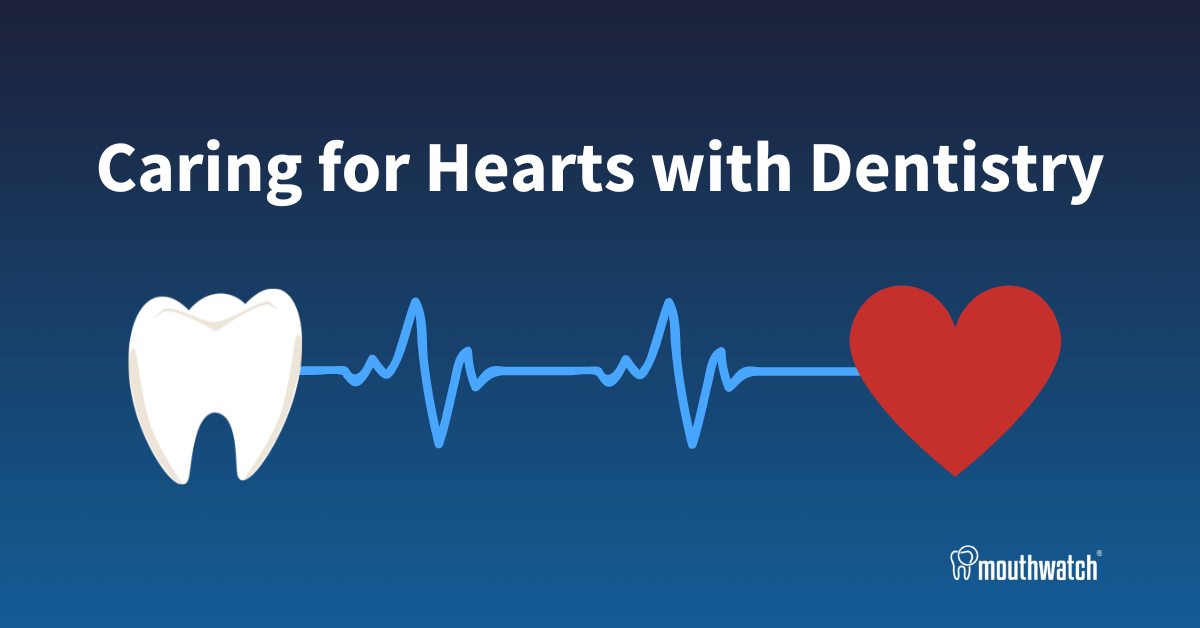
February is American Heart Month
American Heart Month is a time when everyone can take some time to focus on their cardiovascular health. As a dental professional, you might know about the oral-systemic link between oral health and heart disease, but do your patients know that having a healthy oral care routine isn’t just for preventing cavities and maintaining their pearly white smile?
In fact, having a healthy mouth is vital for having a happy and healthy body, including your heart. Oral health has proven to be an important factor in whole-body health. It can impact other systemic health conditions throughout the body and even affect one of the most important organs in your body, your heart, and can contribute to heart disease, the leading cause of death in the United States. But what causes oral health to affect one of the most hard-working organs in the body?
Periodontal and Heart Disease
Research has revealed links between periodontal disease and heart disease. Periodontal disease, also known as gum disease, is an infection of the gum tissues and surrounding bone that hold your teeth in place and can lead to bleeding and receding gums, pain, and even loose teeth. Long-term inflammation resulting from periodontal disease can damage circulation in the gums, allowing bacteria to make their way into the bloodstream and spread throughout the body. This harmful bacteria travels throughout the body, including the heart, resulting in infections, increased inflammation around the heart, and increased plaque build-up within arteries.
An uncommon but potentially life-threatening condition called bacterial endocarditis can occur when bacteria from your mouth enter your bloodstream and settles in the lining of your heart or blood vessels. While this condition can occur in anyone, people with existing heart conditions and those who’ve had it before are at significantly higher risks of developing it. While uncommon, it can still develop in anyone’s body, especially when bacteria from the mouth begin to infect other parts of the body, including the heart. Good oral health can reduce the amount of inflammation in the body and ultimately reduce the number of potentially damaging pathogens that enter the bloodstream.
Individuals with uncontrolled periodontal disease have a higher risk of cardiovascular disease including stroke. Other cardiovascular conditions can also develop, with conditions such as atherosclerosis, myocardial infarction, and thromboembolism.
Helping Patients
With the interconnectedness of oral and overall health, dental professionals can help their patients not only have healthy mouths but healthy hearts. When a patient is diagnosed with periodontitis, they should be educated about the treatment diagnosis, prognosis, and risks if left untreated. This includes recommending tailored oral hygiene plans that include brushing, interdental cleaning options, and professional clinical care, as well as educating patients on their increased risk for cardiovascular diseases. Regularly monitoring periodontal health is vital for all patients, especially those who have already been diagnosed with a cardiovascular disease.
Intraoral cameras are a great tool for monitoring and keeping a detailed record of a patient’s periodontal condition, as well as several other oral conditions. Not only do they assist with case documentation, but also with patient accountability and patient-provider trust. The ability to highlight concerns in their oral condition which can lead to inflammation and increased cardiovascular risk is a valuable tool in education. Patients might not understand what you mean when you describe “periodontal disease” to them. However, when patients can see an anatomically color-accurate HD image of bleeding or receding gums from an intraoral camera like the MouthWatch Plus+, or easy-to-capture high-quality images from the MouthWatch Intraoral Camera, they can immediately recognize the need for treatment without having to understand confusing clinical terminology.
Connected care is also crucial for monitoring the overall health of high-risk patients. With the strong connection between systemic and oral health, the collaboration between a patient’s medical and dental providers should be an expectation, especially with the availability of telehealth platforms in today’s world. With a HIPAA-compliant teledentistry platform like MouthWatch’s TeleDent, dentists can communicate with a patient’s primary care provider about possible cardiovascular conditions and collaborate to improve patient outcomes.
Self-care
What can patients do at home to prevent developing these, in some cases, life-threatening cardiovascular conditions? Reducing the risk of cardiovascular disease starts with practicing proper oral care. Conditions like periodontitis are largely preventable, usually treatable, and are typically a result of poor oral hygiene. Developing good oral health habits such as brushing twice a day, cleaning interproximally, and attending regular dental checkups can not only help reduce chances of developing gum disease but help improve successful treatment outcomes.
Regular dental checkups don’t always mean an in-office appointment. An increasing number of dental providers are offering virtual consultations through teledentistry platforms that let patients connect with their providers from any location and get the information they need to feel confident about their oral health and the decisions they make.
A healthy mouth translates to better overall health and well-being, including a healthier heart. With technology like telehealth and teledentistry becoming more popular, patient care teams are better aligned and can more easily coordinate with one another, leading to better oral and systemic health outcomes.
